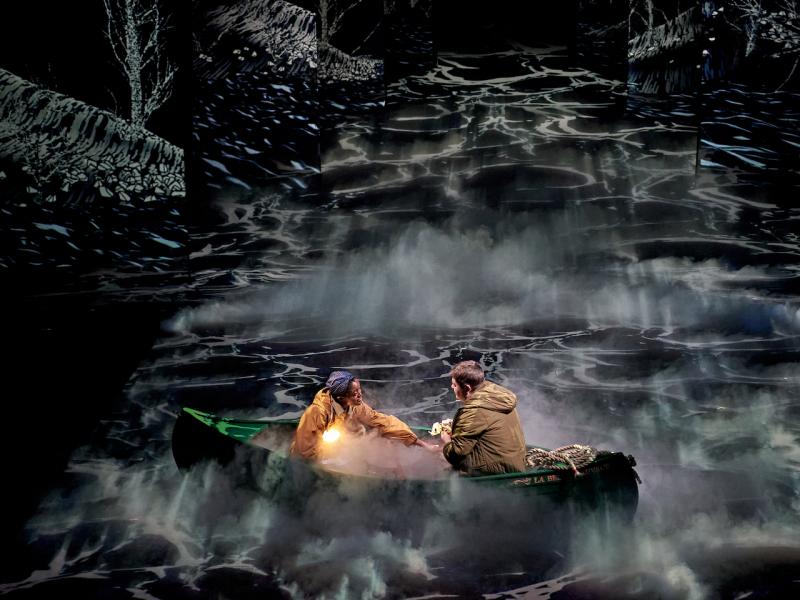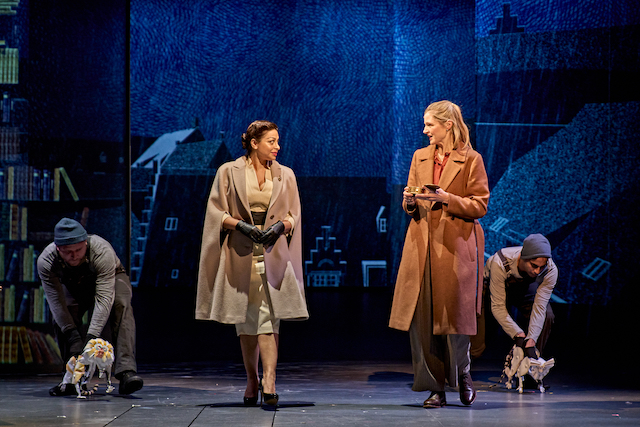The Book of Dust, Bridge Theatre review – as much intelligence and provocation as fleet-footed fun | reviews, news & interviews
The Book of Dust, Bridge Theatre review – as much intelligence and provocation as fleet-footed fun
The Book of Dust, Bridge Theatre review – as much intelligence and provocation as fleet-footed fun
The stage magic is both ingenious and beguiling

It’s been seventeen years since Nicholas Hytner first directed Philip Pullman’s His Dark Materials at the National Theatre, ambitiously whirling audiences into Pullman’s universe of daemons, damnable clerics and parallel worlds.
Samuel Creasey plays Malcolm Polstead, the bookish wide-eyed 12-year-old who becomes embroiled in forces beyond his control when he goes to visit potato-planting nuns and discovers they are concealing a baby. For the tiny minority who aren’t familiar with Pullman’s concept of the daemon as the manifestation of a person’s inner-self, we’re able to watch Malcolm’s daemon shift from mouse, to lizard to kingfisher, unable to settle as one life-form till he reaches adulthood.
Pullman has described The Book of Dust trilogy (this is an adaptation of the first book, La Belle Sauvage) as an exploration of consciousness. The fact that an individual’s daemon shifts shape until they fully mature underlines the idea that we become the kind of adult that we are through the intellectual and moral decisions that we make. Here we watch Malcolm, who has grown up in a pub, evolve as he realises that the girl baby is in danger because prophecies have foretold that she threatens the repressive church-like Magisterium. He is assisted in this by Ella Dacres’ iron-willed Alice Parslow, a fifteen-year-old with an unhappy childhood who works in his mother’s pub and, alongside her daemon, has an A-grade bullshit detector.
A huge part of the power of Pullman’s storytelling is that its many influences – not least Milton’s Paradise Lost – include quantum physics, Nordic and Greek mythology, spiced up by a withering dissection of the sexism and repression inherent in the history of the church. It’s a testament to Lavery’s adaptation that we always sense that conceptual complexity at the same time as being able to enjoy La Belle Sauvage as a fly-by-the-seat of your pants adventure. There’s no shortage of stage magic. But it’s helped by the sense of power and rigour in the words.
Though the stage magic is wonderfully beguiling in itself, not least because of Luke Halls' video design which enables Malcolm’s canoe to speed convincingly through waters that become increasingly turbulent as the action progresses. It also whisks the action through locations and seasons with projections of tangled woods and Gothic-style buildings that manage simultaneously to look real and like the best kind of book illustrations.
The outstanding puppetry in Life of Pi provides stiff competition for any puppet director in London right now. That said Barnaby Dixon’s puppet design subtly manages to evoke the life force of the characters’ different daemons through ethereal recreations of each animal with white lights that gleam like miniature souls. There’s a sense of a distinct identity established through the movement of each puppet, whether it’s in the swift yet nervous flutterings of Malcolm’s kingfisher or - most powerfully - the sinister maimed hyena that accompanies one of the story’s most repellent villains, Pip Carter’s silky-voiced Gerard Bonneville.
In proof, perhaps, that there’s no magic like old magic, one of the great show-stealing turns of the production is having the infant Lyra played by a real-life baby. The inherent unpredictability of babies inevitably means this will change the dynamic of the show each evening – but on the night I went the baby played her part to perfection, inducing gasps as she was revealed by the nuns to gaze out with wide-eyed wonder at the audience. How it will change the production when she, or indeed any other baby in the part, is screaming their head off it’s hard to know. But yesterday it felt like an inspired touch.
 It also brings added potency to a Christmas show in which a baby girl Messiah who threatens to dismantle the hypocrisy of the Church is presented as an alternative version to a baby boy Messiah who, despite preaching tolerance, managed to inspire a despotic often violent institution. One of Pullman’s great accomplishments with both his trilogies has been to take a narrative that has sidelined women for centuries by fetishising their purity and innocence, and turn it into something more complex.
It also brings added potency to a Christmas show in which a baby girl Messiah who threatens to dismantle the hypocrisy of the Church is presented as an alternative version to a baby boy Messiah who, despite preaching tolerance, managed to inspire a despotic often violent institution. One of Pullman’s great accomplishments with both his trilogies has been to take a narrative that has sidelined women for centuries by fetishising their purity and innocence, and turn it into something more complex.
The male and female leads of Hytner’s production are supported by a strong ensemble, not least Naomi Frederick as the wise female academic, Dr Hannah Relf (above right), Ayesha Dharker as a stylishly diabolical Marisa Coulter (above left) and John Light as a thundering Lord Ariel. The nuns also, played by Holly Atkins, Wendy Mae Brown and Julie Atherton, give an enjoyable sense of the irreverence that can lurk beneath a wimple.
And when the flood sweeps through the story at the end we appreciate once more the degree to which this is a narrative that richly reflects our rapidly changing world. There’s a lot of great theatre playing in London right now, but this is where to head for if you’re looking for something with as much intelligence and provocation as fleet-footed fun.
rating
Explore topics
Share this article
The future of Arts Journalism
You can stop theartsdesk.com closing!
We urgently need financing to survive. Our fundraising drive has thus far raised £49,000 but we need to reach £100,000 or we will be forced to close. Please contribute here: https://gofund.me/c3f6033d
And if you can forward this information to anyone who might assist, we’d be grateful.

Subscribe to theartsdesk.com
Thank you for continuing to read our work on theartsdesk.com. For unlimited access to every article in its entirety, including our archive of more than 15,000 pieces, we're asking for £5 per month or £40 per year. We feel it's a very good deal, and hope you do too.
To take a subscription now simply click here.
And if you're looking for that extra gift for a friend or family member, why not treat them to a theartsdesk.com gift subscription?
more Theatre
 Edinburgh Fringe 2025 reviews: The Ode Islands / Delusions and Grandeur / Shame Show
Experimental digital performance art, classical insights and gay shame in three strong Fringe shows
Edinburgh Fringe 2025 reviews: The Ode Islands / Delusions and Grandeur / Shame Show
Experimental digital performance art, classical insights and gay shame in three strong Fringe shows
 Edinburgh Fringe 2025 reviews: Ordinary Decent Criminal / Insiders
Two dramas on prison life offer contrasting perspectives but a similar sense of compassion
Edinburgh Fringe 2025 reviews: Ordinary Decent Criminal / Insiders
Two dramas on prison life offer contrasting perspectives but a similar sense of compassion
 Edinburgh Fringe 2025 reviews: Kinder / Shunga Alert / Clean Your Plate!
From drag to Japanese erotica via a French cookery show, three of the Fringe's more unusual offerings
Edinburgh Fringe 2025 reviews: Kinder / Shunga Alert / Clean Your Plate!
From drag to Japanese erotica via a French cookery show, three of the Fringe's more unusual offerings
 The Two Gentlemen of Verona, RSC, Stratford review - not quite the intended gateway drug to Shakespeare
Shakespeare trying out lots of ideas that were to bear fruit in the future
The Two Gentlemen of Verona, RSC, Stratford review - not quite the intended gateway drug to Shakespeare
Shakespeare trying out lots of ideas that were to bear fruit in the future
 Edinburgh Fringe 2025 reviews: The Horse of Jenin / Nowhere
Two powerful shows consider the Israeli-Palestinian conflict, with mixed results
Edinburgh Fringe 2025 reviews: The Horse of Jenin / Nowhere
Two powerful shows consider the Israeli-Palestinian conflict, with mixed results
 Edinburgh Fringe 2025 reviews: The Fit Prince / Undersigned
A joyful gay romance and an intimate one-to-one encounter in two strong Fringe shows
Edinburgh Fringe 2025 reviews: The Fit Prince / Undersigned
A joyful gay romance and an intimate one-to-one encounter in two strong Fringe shows
 Tom at the Farm, Edinburgh Fringe 2025 review - desire and disgust
A visually stunning stage re-adaptation of a recent gay classic plunges the audience into blood and earth
Tom at the Farm, Edinburgh Fringe 2025 review - desire and disgust
A visually stunning stage re-adaptation of a recent gay classic plunges the audience into blood and earth
 Works and Days, Edinburgh International Festival 2025 review - jaw-dropping theatrical ambition
Nothing less than the history of human civilisation is the theme of FC Bergman's visually stunning show
Works and Days, Edinburgh International Festival 2025 review - jaw-dropping theatrical ambition
Nothing less than the history of human civilisation is the theme of FC Bergman's visually stunning show
 Every Brilliant Thing, @sohoplace review - return of the comedy about suicide that lifts the spirits
Lenny Henry is the ideal ringmaster for this exercise in audience participation
Every Brilliant Thing, @sohoplace review - return of the comedy about suicide that lifts the spirits
Lenny Henry is the ideal ringmaster for this exercise in audience participation
 Edinburgh Fringe 2025 reviews: The Beautiful Future is Coming / She's Behind You
A deft, epoch-straddling climate six-hander and a celebration (and take-down) of the pantomime dame at the Traverse Theatre
Edinburgh Fringe 2025 reviews: The Beautiful Future is Coming / She's Behind You
A deft, epoch-straddling climate six-hander and a celebration (and take-down) of the pantomime dame at the Traverse Theatre
 Good Night, Oscar, Barbican review - sad story of a Hollywood great's meltdown, with a dazzling turn by Sean Hayes
Oscar Levant is an ideal subject to refresh the debate about media freedom
Good Night, Oscar, Barbican review - sad story of a Hollywood great's meltdown, with a dazzling turn by Sean Hayes
Oscar Levant is an ideal subject to refresh the debate about media freedom
 Edinburgh Fringe 2025 reviews - Monstering the Rocketman by Henry Naylor / Alex Berr
Tabloid excess in the 1980s; gallows humour in reflections on life and death
Edinburgh Fringe 2025 reviews - Monstering the Rocketman by Henry Naylor / Alex Berr
Tabloid excess in the 1980s; gallows humour in reflections on life and death

Add comment